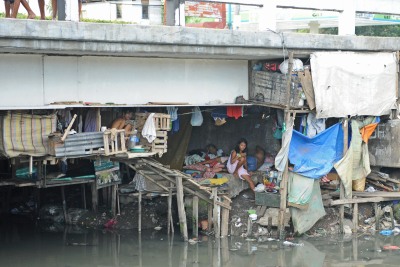Violence and the trivialisation of poverty

First day of the Colloquium
Enough! Those who speak of poverty are always the same
« We can’t continue being silent, only letting those who know speak ». These words of Valentina Ccoyo, from Cuzco, Peru, opened the Colloquium on Tuesday 24th January 2012.
More than 300 people have been involved in this three year international research, based on participatory action. Most of the participants have a experience of living extreme poverty. Donna Haig Friedmann, researcher at the Centre for Social Policy of the University of Massachushetts, called ATD Fourth World’s fresh approach « counter-cultural » to academia’s usual approaches.
Participants spoke up on this first day with examples of the trivialisation of extreme poverty. Cases where human rights are denied, where people living in extreme poverty are excluded from active participation.
Ricarl Pierrelouis, from Mauritius, spoke of an entire village being evicted in order for the authorities to build a dam. The villagers were not consulted, and they now live further from work opportunities, with even more difficult conditions of access to schooling.
In the UK, parents writing letters to their children in care are not allowed to express their emotions – if they do, local authorities may not allow anymore letters.
In Lebanon, migrant domestic workers are not covered by national law. They do not report any violence they may be a victim of, as they know nothing will come of it. Instead, they suffer, and often return to their country.
Speaking of the non-recognition of people living in extreme poverty, Moraene Roberts underscored how the emotions and words of people living in poverty are misinterpreted: « to complain is seen as non-cooperation; to protest as aggression, to explain as making excuses ».
Indeed, the importance of understanding one another, and the language that each and everyone uses, was a major issue in the discussions, both in plenary sessions and in the smaller groups. Diana Skelton, from the International Leadership Team of ATD Fourth World, highlighted the importance of this issue at the beginning of the day.
In this choice of language, in choosing not to label people, society has a role to play. Academics, policy-makers and institutions could and should undertake changes in this area. The afternoon plenary session further underscored how fundamental this is. As one participant said, « It is not so much the solutions reached in our dialogue that are important, as being able to reach these solutions all together ».
See below several interviews of participants :
Thomas Mayes (United Kingdom), Sean Dunne (Ireland) and Ronald Schexnayder (USA)

Play with Vimeo
By clicking on the video you accept that Vimeo drop its cookies on your browser.
Beatrice Epaye (Central African Republic)

Play with Vimeo
By clicking on the video you accept that Vimeo drop its cookies on your browser.
Mélanie Merle (Ile Maurice)

Play with Vimeo
By clicking on the video you accept that Vimeo drop its cookies on your browser.

